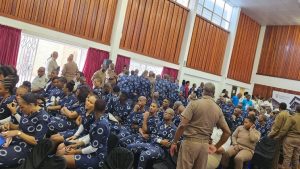Family, friends, and military veterans paid tribute to the long life and significant military legacy of Colonel Jan Breytenbach at a moving memorial service at the Voortrekker Monument in Pretoria. Breytenbach made invaluable contributions during a military career spanning around four decades to three of South Africa’s elite fighting units: Special Forces, 32 Battalion and 44 Parachute Brigade. He passed away in George on 16 June at the age of 91.
Speaking during the memorial service held against the backdrop of the Wall of Remembrance, Marius van Rooyen, Chaplain for the Council of Military Veterans Organisations in South Africa, said Breytenbach would be remembered for his leadership, courage and compassion, and that he had made an invaluable contribution to the country.
Breytenbach began his military career in 1950 at the Army Gymnasium. He was selected for officer cadet training and in 1953 was awarded the Sword of Honour as the top student, an early indication of his outstanding abilities. Disillusioned with the then Union Defence Force he resigned and joined the Royal Navy’s Fleet Air Arm in 1956 as a navigator. This saw him participate in the Suez crisis in 1956.
In 1961, he joined the new South African Defence Force and was posted to 1 Parachute Battalion. Again, his potential was recognised and he was selected for a Rhodesian SAS selection course. With his understanding of counter-terrorism operations he was chosen to lead a small team to train the Biafrans during the Nigerian civil war in 1969.
In 1970, when the SADF approved the establishment of a Special Forces unit (1 Reconnaissance Commando), he was part of the initial group which was colloquially known as the ‘Dirty Dozen’. He became the unit’s first commander. During 1976, he was instrumental in establishing 32 Battalion, which comprised largely soldiers from the National Front for the Liberation of Angola. This was the renowned rapid-raiding light infantry battalion with the nickname Os Terrívais (The Terrible Ones) during the Border War.
Colonel Breytenbach commanded 44 Parachute Brigade from 24 September 1980 to 31 December 1982 and founded the SADF Guerilla School, which he commanded until his retirement in 1987. Although retired, the military and military history remained a significant part of his life and he wrote several military history books, including on 32 Battalion and the controversial Cassinga raid. Breytenbach was one of the commanders of the paratroop assault on the heavily armed South West African People’s Organisation camp at
Legendary found of SA Special Forces remembered in Pretoria
Family, friends, and military veterans paid tribute to the long life and significant military legacy of Colonel Jan Breytenbach at a moving memorial service at the Voortrekker Monument in Pretoria. Breytenbach made invaluable contributions during a military career spanning around four decades to three of South Africa’s elite fighting units: Special Forces, 32 Battalion and 44 Parachute Brigade. He passed away in George on 16 June at the age of 91.
Speaking during the memorial service held against the backdrop of the Wall of Remembrance, Marius van Rooyen, Chaplain for the Council of Military Veterans Organisations in South Africa, said Breytenbach would be remembered for his leadership, courage and compassion, and that he had made an invaluable contribution to the country.
Breytenbach began his military career in 1950 at the Army Gymnasium. He was selected for officer cadet training and in 1953 was awarded the Sword of Honour as the top student, an early indication of his outstanding abilities. Disillusioned with the then Union Defence Force he resigned and joined the Royal Navy’s Fleet Air Arm in 1956 as a navigator. This saw him participate in the Suez crisis in 1956.
In 1961, he joined the new South African Defence Force and was posted to 1 Parachute Battalion. Again, his potential was recognized and he was selected for a Rhodesian SAS selection course. With his understanding of counter-terrorism operations he was chosen to lead a small team to train the Biafrans during the Nigerian civil war in 1969.
In 1970, when the SADF approved the establishment of a Special Forces unit (1 Reconnaissance Commando), he was part of the initial group which was colloquially known as the ‘Dirty Dozen’. He became the unit’s first commander. During 1976, he was instrumental in establishing 32 Battalion, which comprised largely soldiers from the National Front for the Liberation of Angola. This was the renowned rapid-raiding light infantry battalion with the nickname Os Terrívais (The Terrible Ones) during the Border War.
Colonel Breytenbach commanded 44 Parachute Brigade from 24 September 1980 to 31 December 1982 and founded the SADF Guerilla School, which he commanded until his retirement in 1987. Although retired, the military and military history remained a significant part of his life and he wrote several military history books, including on 32 Battalion and the controversial Cassinga raid. Breytenbach was one of the commanders of the paratroop assault on the heavily armed South West African People’s Organisation camp at Cassinga.
American David Barr, himself a Vietnam War veteran, travelled from Los Angeles to pay his respects to the man to whom he owed his life. He said he was Breytenbach’s personal gunner in the field when their vehicle hit a landmine in Angola in 1981. Barr said Breytenbach pulled him free from the fiercely burning vehicle before the explosives detonated. He lost both legs in the incident. Barr paid his tribute to Breytenbach: “He was a man’s man; a soldier’s soldier and a commander’s commander.”
Summing up the extraordinary career and contribution to both local and international military culture, Major-General (Retired) Dan Lamprecht – one of the three remaining members of the ‘Dirty Dozen’ at the memorial, had these words: “He was the right man in the right place. He possessed a diverse skill set as a soldier, airman and sailor… Thanks to his personal vision, intellectual capability and ability to lead from the front, he became the most experienced and decorated soldier in the SADF after the Second World War.”
Cassinga
American David Barr, himself a Vietnam War veteran, travelled from Los Angeles to pay his respects to the man to whom he owed his life. He said he was Breytenbach’s personal gunner in the field when their vehicle hit a landmine in Angola in 1981. Barr said Breytenbach pulled him free from the fiercely burning vehicle before the explosives detonated. He lost both legs in the incident. Barr paid his tribute to Breytenbach: “He was a man’s man; a soldier’s soldier and a commander’s commander.”
Summing up the extraordinary career and contribution to both local and international military culture, Major-General (Retired) Dan Lamprecht – one of the three remaining members of the ‘Dirty Dozen’ at the memorial, had these words: “He was the right man in the right place. He possessed a diverse skill set as a soldier, airman and sailor… Thanks to his personal vision, intellectual capability and ability to lead from the front, he became the most experienced and decorated soldier in the SADF after the Second World War.”






